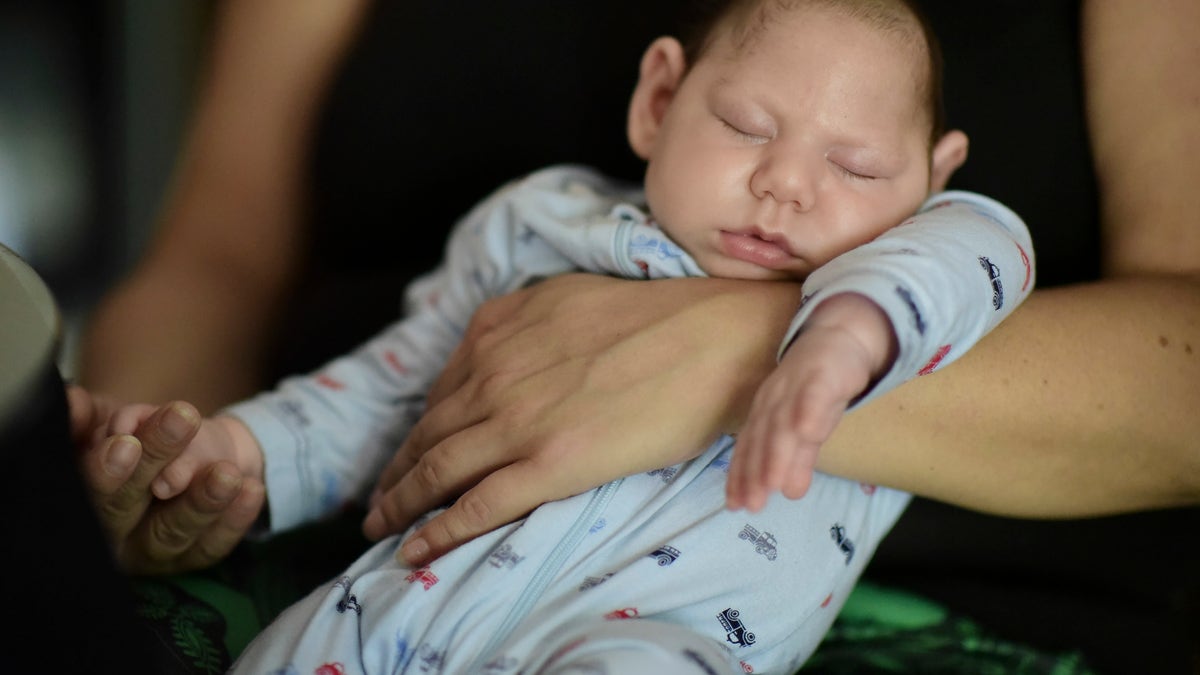
In this Dec. 16, 2016 photo, two-month-old Inti Perez, diagnosed with microcephaly linked to the mosquito-borne Zika virus, is cradled by his mother, in Bayamon, Puerto Rico. The U.S. Centers for Disease Control and Prevention has projected a surge of cases next year. (AP Photo/Carlos Giusti) (Copyright 2016 The Associated Press. All rights reserved.)
SAN JUAN, Puerto Rico – Michelle Flandez had just given birth to her first son, but doctors in this U.S. territory whisked him away before she could see him.
Perplexed, she demanded him back and then slowly unwrapped the blanket that covered him.
"My husband and I looked at each other," she recalled. "No one had warned us. No one had given us the opportunity to decide what to do."
It was mid-October, and in her arms lay what health officials announced as the first known baby born in Puerto Rico with a rare birth defect that has been linked to the mosquito-borne Zika virus. Those with microcephaly have abnormally small heads and often suffer impeded brain growth and other problems.
The island, already struggling with a shortage of doctors and funds amid a worsening economic crisis, has more than 35,700 Zika cases, including nearly 3,000 involving pregnant women. Some 300 people overall have been hospitalized and five have died, including at least two who developed complications from a paralysis condition linked to Zika known as Guillain-Barre.
Since the birth of Flandez's son, named Inti after an Inca sun god, four other babies have been born in Puerto Rico with birth defects linked to Zika, including microcephaly. The U.S. Centers for Disease Control and Prevention has projected a surge in cases next year. A study by the CDC estimates that up to 10,300 pregnant women in Puerto Rico could be infected with Zika and that between 100 and 270 babies could be born with microcephaly. The U.S. mainland, meanwhile, has reported more than 30 cases of birth defects linked to Zika.
While Flandez had symptoms of Zika early in her pregnancy, she said she was told that tests showed a false positive. Sonograms in August and September showed no problems.
Flandez ran a finger through the silky dark hair on Inti's tiny head on Friday as she described the challenges of raising her 3-month-old son on an island in economic crisis. She called several pediatric neurologists after he was born and found just one who accepted Medicaid. The earliest appointment she could get was in October 2017.
Discouraged, she turned to relatives, one of whom detailed the family's plight on Facebook: "The family has remained quiet for too long. If this message reaches a pediatric neurologist who can help Inti, we will be more than grateful."
The post was shared 11,000 times, and shortly afterward, an official at Puerto Rico's largest public hospital called and arranged an appointment for Inti. Since then, he has received therapy and now has several appointments scheduled through February with other doctors.
But hardships persist. Flandez does not have a car, and she sometimes has to walk an hour with Inti to reach the closest bus stop when neighbors or friends cannot drive her to the doctor. Money also is tight for Flandez and her husband, who live in a two-bedroom apartment with no couch.
"I have to pay rent, I have to eat ... I have to pay for transportation," she said as she cradled a sleepy Inti after breastfeeding him.
Experts fear babies like Inti could develop other disabilities as they grow, burdening a health care system already breaking under an exodus of doctors fleeing for the U.S. mainland. The cost of treating a baby with Zika is estimated at $3.8 million, said Dr. Cynthia Moore, director of the CDC's division of congenital and developmental disorders. She said a Zika infection can bring many consequences, including poor eyesight or motor skills.
"The more we learn about it, the more we find new problems," she said. "It's rapidly evolving."
In Puerto Rico, health officials are pushing to secure more federal funds to fight the Zika epidemic, even as the number of weekly new cases has been dropping. Some of that money might be used as a special bonus for doctors who normally don't accept Medicaid patients, said Dr. Miguel Valencia Prado, director of the Health Department's Division of Children with Special Medical Needs.
In addition, Valencia said he has established videoconferencing with at least two specialists in the U.S. who serve as consultants, and he is considering requesting that doctors based in the U.S. temporarily work in Puerto Rico on a rotational basis.
Meanwhile, Flandez said she is taking it day-by-day with Inti, whom his older sister has nicknamed "Starman" because, as she explained to her mother, he is different from the rest and thus comes from the stars.
Inti likes to have his feet tickled by the family's cat — "She's our emergency therapist," the mother says — and he seems to be soothed by the music of Iron Maiden songs when he cries, Flandez said with a laugh.
"He's a normal child. I don't see him as someone for whom you should have pity," she said. "You never know how long he's going to live or how long I'm going to live. The most important thing is to do what's best right now."